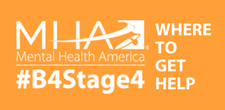When you’ve decided to seek help, knowing what resources are available and where to start can be tricky. Use this decision map to help you figure out your options. If you don’t find help where a path ends, try any of the listed resources.
This worksheet is an excerpt from Mental Health America’s Mental Health Month 2024 Toolkit.
Here’s a web-friendly version of the decision map:
- Are you in a mental health crisis (thinking about hurting yourself or someone else)?
- If no: Skip to #2.
- If yes: Call or text 988 or chat at 988lifeline.org. You can also reach the Crisis Text Line by texting HELLO to 741741.
- Are you a current or former member of the military, or the spouse or child of one?
- If no: Skip to #3.
- If yes—active duty:
- Military OneSource provides confidential, short-term counseling for active duty military personnel and their families.
- Military Chaplains are mental health service providers.
- TRICARE has a 24/7 Nurse Advice Line at 1-800-874-2273.
- If yes—veteran:
- Eligible veterans can get care through the V.A. Visit va.gov/health or call 1-877-222-8387.
- Are you a student?
- If no: Skip to #4.
- If yes—K-12:
- Your school’s guidance counselor can talk through things with you and help you find resources or additional help.
- If yes—College / University:
- Your college or university may have a Campus Health Center, or offer referrals to help through the Office of Student Life or Campus Living.
- Active Minds has 1,000+ chapters that act as a support community on campuses across the U.S. See if there is a chapter at your school at activeminds.org/programs.
- Do you have health insurance?
- If no: Skip to #7.
- If yes: Continue to #5.
- Do you have insurance through a government program, like Medicaid or Medicare?
- If no: Skip to #6.
- If yes—Medicaid:
- If yes—Medicare:
- Do you have a primary care provider?
- If no: Your insurance company has a database of providers in your network, which can result in lower costs. You may have to call more than one mental health provider to see who is taking new patients and ask about wait times. Most insurance companies also have a nurse hotline.
- If yes: Your regular or family doctor can provide referrals to mental health specialists or prescribe care in the meantime.
- Do you work for an employer who offers an Employee Assistance Program (EAP)?
- If no: Skip to #8.
- If yes: Your EAP may provide a counseling benefit for a limited number of services or referrals to other providers. Ask your company’s HR department for more information.
- Are you active in your faith community?
- If no: Do one or both of the following:
- Find a local MHA Affiliate in your area by searching at https://mhanational.org/affiliates/ and contact the organization by phone or email. They know the local community. Many of them can put you in touch with peer support or help you find other helpful programs.
- Find a local mental health center. The names vary from state to state, but local mental health departments or community organizations provide free or low-cost treatment and services on a sliding scale, so qualifying people pay based on their income.
- If yes: Local churches, mosques, synagogues or other places of worship may have health ministries or a religious leader who has a counseling certification.
- If no: Do one or both of the following:
"*" indicates required fields

